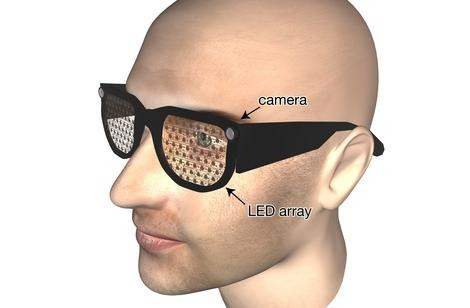British scientists have developed the first pair of bionic glasses that could help thousands of legally blind people. These glasses using tiny cameras and software technology from video games, alert the wearer to objects in their surroundings using flashing lights.
 Video cameras attached to the rim of the glasses capture information about the distance and dimension of objects. This information is then sent via a wire to a computer processor in the wearer's pocket, which interprets the object as a pattern of dots. Small LEDs built into the lenses then light up in the shape of the pattern. Brighter lights suggest closer objects.
Video cameras attached to the rim of the glasses capture information about the distance and dimension of objects. This information is then sent via a wire to a computer processor in the wearer's pocket, which interprets the object as a pattern of dots. Small LEDs built into the lenses then light up in the shape of the pattern. Brighter lights suggest closer objects.
This came from neuroscientist, Stephen Hicks who explained that the glasses had an advantage over the bionic eye, or retinal implants, because they were cheap and non-invasive. “Essentially they are just an iPhone and a pair of glasses.” The glasses would be ideal for elderly people with macular degeneration, who see objects as a blur but cannot focus, see much color or make out specifics he said.
Over the next six months Dr Hicks, a research associate at the University of Oxford, and his team will trial the prototypes on 60 people who are legally blind. Advances in smart phone technology mean Dr Hicks's glasses can be controlled with a palm-sized computer, and will eventually use a wireless connection. Dr Hicks, who presented his invention at The Royal Society's summer science exhibition in London last week said, “A couple of years ago we would have had a laptop in a backpack.” “There is also a lot of software that can do face recognition and tracking so we are adopting techniques like that too,” he added. He envisages the glasses eventually being able to read bus numbers and signs, which can be synthesized into a voice and played into the wearer's ear.
The glasses could be ready for sale by 2014 if tests are successful. The FDA also last year approved a miniature implantable eye telescope that can help people with age-related macular degeneration to better see fine detail.